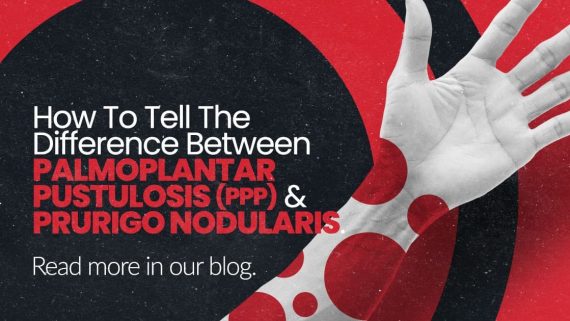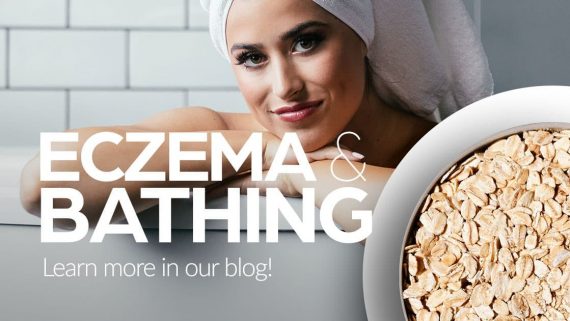Palmoplantar pustulosis (PPP) and prurigo nodularis (PN) are a pair of tongue-twisting skin conditions we’re conducting clinical trials for. Though neither is very common, you can easily confuse the two because of their similarities. Here’s how to tell the difference between palmoplantar pustulosis and prurigo nodularis.
Symptoms of PPP and PN
PPP is a rare form of psoriasis where tiny blisters develop on the palms of hands and soles of feet. As the blisters dry up, they can turn brown and scaly, and deep cracks can form. PPP can be itchy and painful and cause a burning sensation in the hands and feet. As a result, patients may have difficulty walking comfortably or using their hands without pain.

PN affects the skin by causing hard, itchy bumps to form on the arms, legs, upper back, and abdomen. The itching is usually very intense, and patients often scratch themselves to the point of bleeding or pain. Loss of sleep, scarring, and changes to the skin’s surface are some of the most common impacts of PN.

Potential Causes
So far, we know that both conditions involve bumps that can be itchy and painful. On the other hand, they differ in:
- Location on the body
- Type of bump (blister vs. hard bump)
- Itch severity
- Ways they impact patients’ lives
Researchers are still working to identify the exact cause of both conditions better, though there are some potential factors for PPP include:
- An effect of nicotine on the sweat glands of the hands and feet since most patients are current or former smokers
- Family history
- Medication side effects
- Infections
For PN, researchers believe the “itch-scratch-itch cycle” is a significant player in developing this condition. PN begins with itchy skin that causes the uncontrollable urge to scratch and rub it. After about six weeks, the hard bumps form in the areas you’ve been scratching and rubbing. Many people who develop PN already have another condition that makes their skin extremely itchy, like eczema. Individuals with this condition also have thicker nerve cells in the skin, which may mean the signals letting the brain know the skin is itchy are more substantial than someone without PN.
Treatment
Treating both conditions involves a combination of therapies that you apply to the skin, take by mouth, or inject. These aim to:
- Remove or lessen the appearance of bumps
- Reduce the itchiness
- Suppress the overactive response from the immune system
- Control inflammation
In addition, habit reversal therapy is another part of treating PN that helps reduce the frequency of scratching. This technique uses awareness training and behavior modification therapy to create alternatives to scratching the skin.
ActivMed Practices & Research is looking for individuals with PPP and PN to join enrolling research studies evaluating potential new care options. To see if you may qualify, visit the Portsmouth, NH webpage for our PPP studies or visit the Beverly, MA webpage for our PN studies today!
Sources:
https://www.aad.org/public/diseases/a-z/prurigo-nodularis-treatment
https://rarediseases.info.nih.gov/diseases/7480/prurigo-nodularis
When living with atopic dermatitis (eczema), setting up a good skincare and moisturization routine is important for managing symptoms and preventing flares. Keeping the skin clean is one of the many reasons bathing and eczema go together like peanut butter and jelly.
Eczema and Dry Skin
The uppermost layer of our skin is what keeps irritants, bacteria, viruses, and allergens from getting into our bodies and moisture from getting out. Eczema is a skin condition that affects this layer and causes dry skin and a variety of symptoms, including:
- Itchiness
- Swelling
- Redness
- Scaling

Eczema also causes your skin to be more sensitive to irritants, leading to a flare-up. A flare-up is a phase of eczema where you experience worsening severity of one or more of the symptoms. Common triggers may include:
- Extended exposure to dry air
- Extreme heat or cold
- Some types of soap, shampoo, bubble bath, body wash, facial cleansers
- Laundry detergents and fabric softeners with chemical additives
- Certain fabrics like wool or polyester in clothing and sheets
- Metals, especially nickel, in jewelry or utensils
Soak and Seal

Individuals with eczema tend to have drier skin and are sensitive to encounters. Proper bathing and moisturization are good ways to keep the skin clean and prevent drying out. The “Soak and Seal” method is what many providers recommend to combat dry skin and reduce flares. To get the full therapeutic benefit, follow these steps:
- Take a bath using lukewarm (not hot) water for 5 to 10 minutes. Use a gentle cleanser (no harsh soaps) and avoid scrubbing the affected skin.
- After bathing, pat the skin lightly with a towel leaving it slightly damp.
- Apply a topical prescription medication to the affected areas of the skin per your doctor’s instructions.
- Within three minutes, liberally apply a cream or ointment type of moisturizer all over the body.
- Wait a few minutes to let the moisturizer absorb into the skin before dressing or applying wet wraps.
Eczema Symptoms Can be Persistent.

Do you have eczema and are experiencing persistent symptoms? Clinical research studies may help! As a research volunteer, you can help advance future care options for yourself and other individuals living with eczema. To learn more about currently enrolling eczema studies here at ActivMed, contact our Portsmouth, NH location at (603) 319-8863 or visit our website.
Sources:
https://www.aad.org/public/diseases/eczema/childhood/itch-relief/baths-moisturizer


